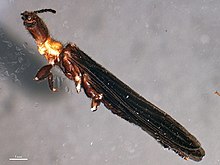
Carpenter bees are species in the genus Xylocopa of the subfamily Xylocopinae. The genus includes some 500 bees in 31 subgenera. The common name "carpenter bee" derives from their nesting behavior; nearly all species burrow into hard plant material such as dead wood or bamboo. The main exceptions are species in the subgenus Proxylocopa, which dig nesting tunnels in suitable soil.

The Ulidiidae or picture-winged flies are a large and diverse cosmopolitan family of flies (Diptera), and as in related families, most species are herbivorous or detritivorous. They are often known as picture-winged flies, along with members of other families in the superfamily Tephritoidea that have patterns of bands or spots on the wings. Some species share with the Tephritidae an unusual elongated posteroapical projection of the anal cell in the wing, but can be differentiated by the smoothly curving subcostal vein. Two species, Tetanops myopaeformis and Euxesta stigmatias, are agricultural pests.

The minute black scavenger flies or "dung midges", are a family, Scatopsidae, of nematoceran flies. Despite being distributed throughout the world, they form a small family with only around 250 described species in 27 genera, although many await description and doubtless even more await discovery. These are generally small, sometimes minute, dark flies, generally similar to black flies (Simuliidae), but usually lacking the humped thorax characteristic of that family.

Sarcophaga is a genus of true flies and the type genus of the flesh-fly family (Sarcophagidae). The members of this cosmopolitan genus are frequently known as common flesh flies.

The Richardiidae are a family of Diptera in the superfamily Tephritoidea.
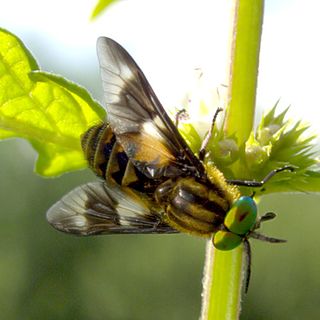
Superfamily Tabanoidea are insects in the order Diptera.

Alderflies are megalopteran insects of the family Sialidae. They are closely related to the dobsonflies and fishflies as well as to the prehistoric Euchauliodidae. All living alderflies – about 66 species all together – are part of the subfamily Sialinae, which contains between one and seven extant genera according to different scientists' views.
Oscinisoma is a genus of frit flies in the family Chloropidae. There are about eight described species in Oscinisoma.

Platystomatinae is a subfamily of flies (Diptera) in the family Platystomatidae that includes 80 genera, the largest subfamily with at last estimate, c. 900 species globally.

Pantophthalmus is a genus of large, robust flies whose larvae feed on living and dead trees, and contains all but one of the species in the family Pantophthalmidae.
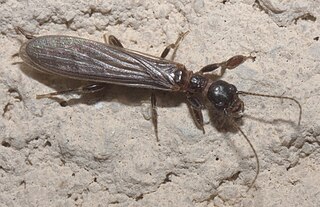
Oligotoma is a genus of webspinners, insects in the order Embioptera, also known as Embiidina. The type species is Oligotoma saundersii and the type locality the Indian subcontinent. The males have wings but the females are flightless. Embiids are recognisable by the enlarged front tarsi, which contain a large number of silk glands that they use to spin the threads they use for building the tubes and galleries in which they live.
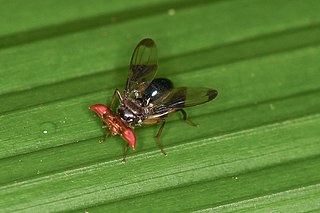
Richardia is a genus of flies in the family Richardiidae. It was first described by French entomologist Jean-Baptiste Robineau-Desvoid in 1830. It occurs from Mexico to Central and South America.

Rainieria is a genus of stilt-legged flies in the family Micropezidae. There are at least 20 described species in Rainieria.
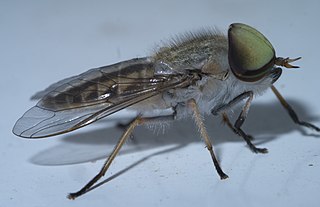
Tabaninae is a subfamily in the family Tabanidae commonly known as horse flies. There are more than 3000 described species in Tabaninae.

Diachlorini is a tribe of horse flies in the family Tabanidae.

Tabanini is a tribe of horse and deer flies in the family Tabanidae. There are at least 220 described species in Tabanini.
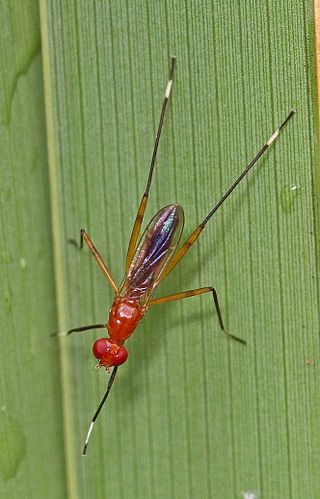
Grallipeza is a genus of stilt-legged flies in the family Micropezidae. There are at least 40 described species in Grallipeza.

Cerastipsocus is a genus of common barklice in the family Psocidae. There are more than 20 described species in Cerastipsocus.

Phalacrotophora is a genus of scuttle flies. There are at least 50 described species in Phalacrotophora.
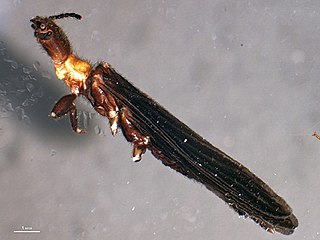
Clothodidae is a family of webspinners in the order Embioptera. There are about 8 genera and 25 described species in Clothodidae.
